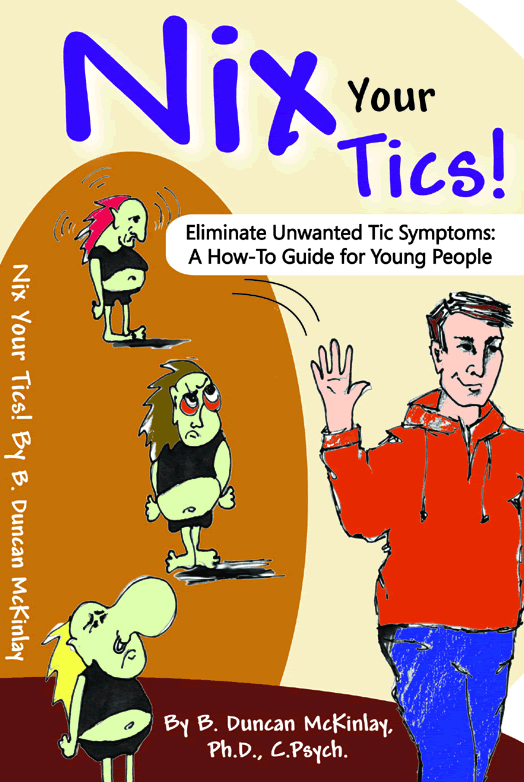Home
Nix Your Tics
Documentary
Writings
Youth Haven
Ask Dr. Dunc
Accolades
Presentations
Resources
Links
Disclaimer
Contact
If
you are a new visitor, diagnosed with a difference, please read this introduction
letter to you.
For
all other new visitors, Dr. McKinlay also has a
special introduction letter to you.

Nix Your Tics!
The Second
(E-)dition from "Life's A Twitch! Publishing". Click here to learn more.
To watch the Life's A Twitch! documentary via streaming video, click
here.
If
you would like to reprint writings from this site, please click
here.
Before
Signing the Guestbook

 
To
return to the 'Print Profiles' archive page, please click
here.
|
 |
1998 - 2018 |
 |
|
|
Living
proof Tourette's sufferers can succeed
BY CHRIS KITCHING
THE PORTAGE LA PRAIRIE DAILY GRAPHIC
Monday
October 7, 2002: When Dr. Duncan McKinlay was a young
boy, he knew he was a little different from the rest of the children
in his class.
He
was sure of it by the time he was seven. But at such a young
age, his feelings were too difficult to understand.
"I
had so many troubles for so long," the Toronto resident
said on Friday during a break in teachers' professional development
seminars. "I didn't understand what was going on and that
made me very afraid."
Because
of those fears, he chose to hide his "secret."
But
the differences remained, and it wasn't until nine years ago
he learned what separated him from the other kids.
When
he was 19, McKinlay, now 28, was diagnosed with Tourette's
Syndrome, a neurological disorder that produces involuntary
movements or vocalizations.
The
news struck fear in his heart, but conjured an overwhelming
sense of relief.
"Right
away I assumed no one would understand and that no one would
want to be my friend," he said. "But it was like
the weight of the world had been lifted off my shoulders."
Next,
McKinlay was faced with the tough task of revealing the discovery
to his family and friends.
"I
thought if anyone found out about my 'secret' they'd lock
me up and throw away the key," he laughed. "A person's
reaction or attitude towards Tourette's can do far more damage
than any symptom will ever do."
But
most of those lingering fears and doubts were quashed once he
let the cat out of the bag.
His
friends embraced him and his family showed tremendous support.
However,
others were still a little hesitant to accept his condition.
"Some
people thought I was just looking for an excuse to cover some
of the things I was doing," he said. "But people
should never use Tourette's as a way out."
Because
of those nagging doubts, McKinlay still felt a little uneasy.
It took an inspiring discussion with a colleague to help him
realize the root of the feeling.
"One
day a friend said, 'Duncan, we don't have a problem with your
Tourette's, you have a problem with it, and that makes it
uncomfortable for us," he said. "I soon realized
I was my own enemy because I was afraid to talk about my condition.
It can be very easy to feel sorry for yourself."
That
realization allowed McKinlay to begin understanding Tourette's
syndrome and come to terms with it.
"As
I learned more about the condition, I began to let more of
my symptoms out," he said, adding he educated his friends
and family to keep everyone at ease.
"When
you have a condition like this, it's pretty important that people
around you are aware of what's happening," McKinlay said.
On
Friday, he was at the William Glesby Centre to help create
more awareness.
The
doctor gave local teachers and administrators tips and lessons
on how to interact with special needs students. He also gave
them a look into the life of someone with Tourette's syndrome.
To
date, McKinlay's existence has been a special tale.
After
he was diagnosed in 1993, he received a bachelors degree with
honours in psychology at McMaster University in Hamilton.
He
followed that accomplishment by obtaining both an applied
masters in educational psychology and his doctorate in psychology
special programs at the University of Waterloo in Ontario.
McKinlay
is also the director of the Tourette Syndrome Foundation of
Canada.
Since
his early fears, he has embraced his condition and surpassed
some of the boundaries and myths that some Tourette's sufferers
face.
In
fact, most people are unaware Tourette's sufferers include successful
doctors, lawyers, professional athletes and actors, he pointed
out.
"When
people think of Tourette's, most think of a person who swears
repeatedly, but that's rare," McKinlay said. "Most
people with Tourette's have very fair symptoms that aren't
noticeable."
Still,
some of the symptoms can create misunderstandings at home and
at school, he said.
But
that is where McKinlay springs into action. In his seminars,
he clears up the myths and states the facts on a personal
level.
Top
of Page |